Monthly Archives: June 2023

Renunciation
Amidst a charade insula governorship, after a charade military invasion, Sancho Panza renounces worldly wealth and ambitions.
He (Sancho) got himself dressed at last, and then, slowly, for he was sorely bruised and could not go fast, he proceeded to the stable, followed by all who were present, and going up to Dapple embraced him and gave him a loving kiss on the forehead, and said to him, not without tears in his eyes, “Come along, comrade and friend and partner of my toils and sorrows; when I was with you and had no cares to trouble me except mending your harness and feeding your little carcass, happy were my hours, my days, and my years; but since I left you, and mounted the towers of ambition and pride, a thousand miseries, a thousand troubles, and four thousand anxieties have entered into my soul;” and all the while he was speaking in this strain he was fixing the pack-saddle on the ass, without a word from anyone. Then having Dapple saddled, he, with great pain and difficulty, got up on him, and addressing himself to the majordomo, the secretary, the head-carver, and Pedro Recio the doctor and several others who stood by, he said, “Make way, gentlemen, and let me go back to my old freedom; let me go look for my past life, and raise myself up from this present death. I was not born to be a governor or protect islands or cities from the enemies that choose to attack them. Ploughing and digging, vinedressing and pruning, are more in my way than defending provinces or kingdoms. Saint Peter is very well at Rome; I mean each of us is best following the trade he was born to. A reaping-hook fits my hand better than a governor’s sceptre; I’d rather have my fill of gazpacho than be subject to the misery of a meddling doctor who kills me with hunger, and I’d rather lie in summer under the shade of an oak, and in winter wrap myself in a double sheepskin jacket in freedom, than go to bed between holland sheets and dress in sables under the restraint of a government. God be with your worships, and tell my lord the duke that ‘naked I was born, naked I find myself, I neither lose nor gain;’ I mean that without a farthing I came into this government, and without a farthing I go out of it, very different from the way governors commonly leave other islands. Stand aside and let me go; I have to plaster myself, for I believe every one of my ribs is crushed, thanks to the enemies that have been trampling over me to-night.”
“That is unnecessary, señor governor,” said Doctor Recio, “for I will give your worship a draught against falls and bruises that will soon make you as sound and strong as ever; and as for your diet I promise your worship to behave better, and let you eat plentifully of whatever you like.”
“You spoke late,” said Sancho. “I’d as soon turn Turk as stay any longer. Those jokes won’t pass a second time. By God I’d as soon remain in this government, or take another, even if it was offered me between two plates, as fly to heaven without wings. I am of the breed of the Panzas, and they are every one of them obstinate, and if they once say ‘odds,’ odds it must be, no matter if it is evens, in spite of all the world. Here in this stable I leave the ant’s wings that lifted me up into the air for the swifts and other birds to eat me, and let’s take to level ground and our feet once more; and if they’re not shod in pinked shoes of cordovan, they won’t want for rough sandals of hemp; ‘every ewe to her like,’ ‘and let no one stretch his leg beyond the length of the sheet;’ and now let me pass, for it’s growing late with me.”
To this the majordomo said, “Señor governor, we would let your worship go with all our hearts, though it sorely grieves us to lose you, for your wit and Christian conduct naturally make us regret you; but it is well known that every governor, before he leaves the place where he has been governing, is bound first of all to render an account. Let your worship do so for the ten days you have held the government, and then you may go and the peace of God go with you.”
“No one can demand it of me,” said Sancho, “but he whom my lord the duke shall appoint; I am going to meet him, and to him I will render an exact one; besides, when I go forth naked as I do, there is no other proof needed to show that I have governed like an angel.”
“By God the great Sancho is right,” said Doctor Recio, “and we should let him go, for the duke will be beyond measure glad to see him.”


Detroit, a day and a half exploring
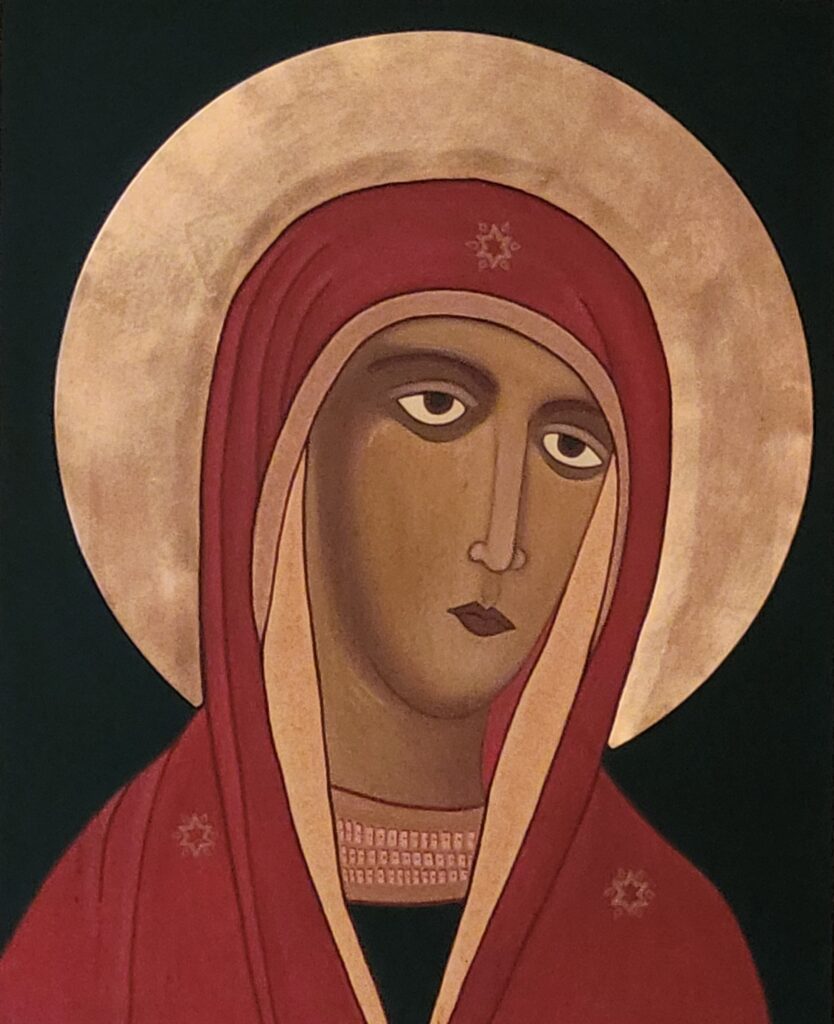
Spending Saturday and Sunday morning in Detroit, I was gifted with a personal tour of the Blessed Sacrament Cathedral during locked door hours. I loved this Mary painting.

Engaged within detachment
Above all, let us love solitude and recollection. We have no right, indeed, to fly from common life and the occupations which obedience enjoins; yet whilst showing ourselves obliging towards our brethren and conscientious in performing our work and the duties of our charge, let us avoid pouring ourselves forth too much on outward things and being absorbed by them; without giving way to injurious intensity of thought, let us collect within us all the powers of our soul in order to keep them attentive to God. Our model ought to be our glorious Father St. Benedict, who, on returning to his well-beloved solitude, dwelt with himself alone under the eye of the heavenly Watcher. There, shutting the doors and avenues of our soul by silence, modesty and recollection, let us make to ourselves an inner sanctuary entirely filled with God, and let us learn to entertain the infinitely great and infinitely loving Guest who dwells within us.
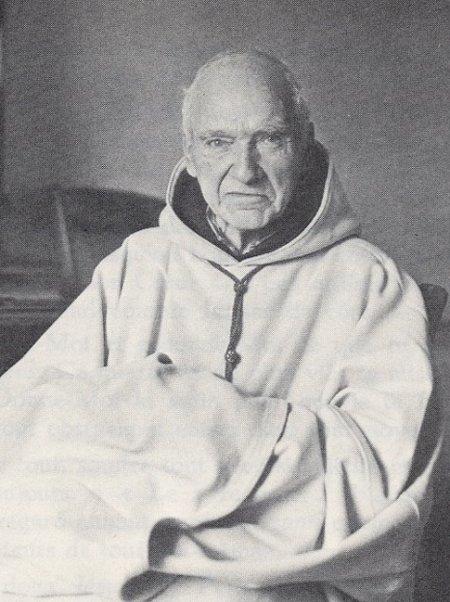

Puppet show destruction
Don Quixote is a true masterpiece of storytelling. Moving beyond the rip-roaring humor lies something profound, relatable to our modern world. The delusion of fighting imaginary battles, perceiving oneself as a valiant knight of honor is perceptible throughout our modern time. Post-post-post modern as it has been identified. With conflicting ideologies, advancing in time well beyond Descartes and the Enlightenment, through Nietzsche and World Wars, on into the realm of pop culture ascendency (instant communal gratification), internet (instant narcissistic reward), population dysphoria, the fear of artificial intelligence, climate change–coupled with manipulated communal fear, a perverse economic climate, and a stream-of-consciousness rapidly accelerating with every passing moment in an unstable world, the temptation to hold the world to task is overwhelming. With everything demanding extreme attention and confrontation, how can one survive without becoming reactionary? In a world screaming daily to define what it is to be a human being how can one not desire to put on the armor of a knight-errant? Loving detachment, the reading of a classic hilarious novel, contemplation and prayer, daily Mass, the rejection of festering, humility and trust, the willingness to accept and smile, many other virtuous practices provide the peace. Man has always known confusing times for all time is troubled.
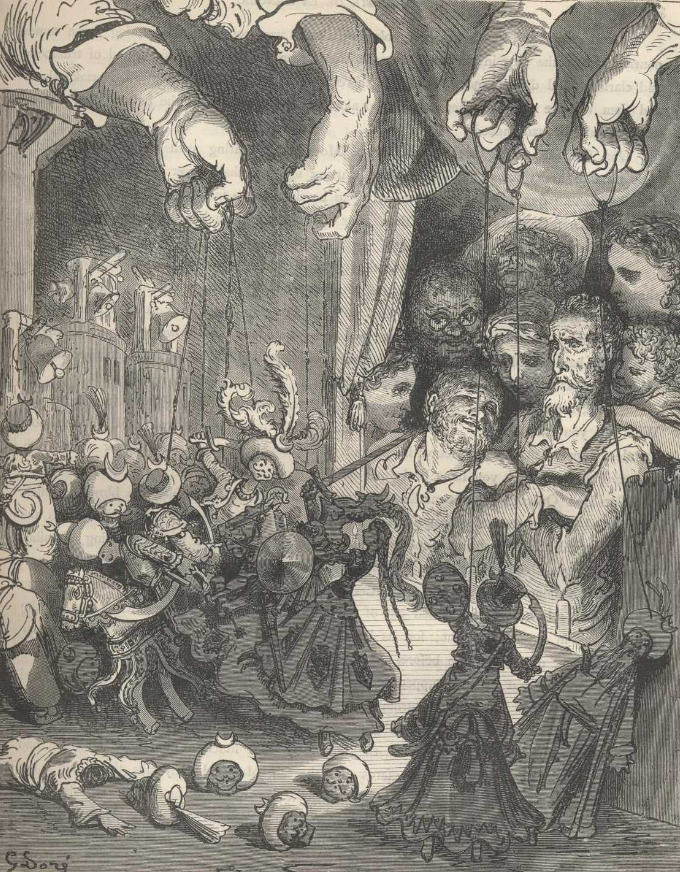
Don Quixote, however, seeing such a swarm of Moors and hearing such a din, thought it would be right to aid the fugitives, and standing up he exclaimed in a loud voice, “Never, while I live, will I permit foul play to be practised in my presence on such a famous knight and fearless lover as Don Gaiferos. Halt! ill-born rabble, follow him not nor pursue him, or ye will have to reckon with me in battle!” and suiting the action to the word, he drew his sword, and with one bound placed himself close to the show, and with unexampled rapidity and fury began to shower down blows on the puppet troop of Moors, knocking over some, decapitating others, maiming this one and demolishing that; and among many more he delivered one down stroke which, if Master Pedro had not ducked, made himself small, and got out of the way, would have sliced off his head as easily as if it had been made of almond-paste. Master Pedro kept shouting, “Hold hard! Señor Don Quixote! can’t you see they’re not real Moors you’re knocking down and killing and destroying, but only little pasteboard figures! Look—sinner that I am!—how you’re wrecking and ruining all that I’m worth!” But in spite of this, Don Quixote did not leave off discharging a continuous rain of cuts, slashes, downstrokes, and backstrokes, and at length, in less than the space of two credos, he brought the whole show to the ground, with all its fittings and figures shivered and knocked to pieces, King Marsilio badly wounded, and the Emperor Charlemagne with his crown and head split in two. The whole audience was thrown into confusion, the ape fled to the roof of the inn, the cousin was frightened, and even Sancho Panza himself was in mighty fear, for, as he swore after the storm was over, he had never seen his master in such a furious passion.
The complete destruction of the show being thus accomplished, Don Quixote became a little calmer, said, “I wish I had here before me now all those who do not or will not believe how useful knights-errant are in the world; just think, if I had not been here present, what would have become of the brave Don Gaiferos and the fair Melisendra! Depend upon it, by this time those dogs would have overtaken them and inflicted some outrage upon them. So, then, long live knight-errantry beyond everything living on earth this day!”
“Let it live, and welcome,” said Master Pedro at this in a feeble voice, “and let me die, for I am so unfortunate that I can say with King Don Rodrigo—
Yesterday was I lord of Spain
To-day I’ve not a turret left
That I may call mine own.
Not half an hour, nay, barely a minute ago, I saw myself lord of kings and emperors, with my stables filled with countless horses, and my trunks and bags with gay dresses unnumbered; and now I find myself ruined and laid low, destitute and a beggar, and above all without my ape, for, by my faith, my teeth will have to sweat for it before I have him caught; and all through the reckless fury of sir knight here, who, they say, protects the fatherless, and rights wrongs, and does other charitable deeds; but whose generous intentions have been found wanting in my case only, blessed and praised be the highest heavens! Verily, knight of the rueful figure he must be to have disfigured mine.”
Sancho Panza was touched by Master Pedro’s words, and said to him, “Don’t weep and lament, Master Pedro; you break my heart; let me tell you my master, Don Quixote, is so catholic and scrupulous a Christian that, if he can make out that he has done you any wrong, he will own it, and be willing to pay for it and make it good, and something over and above.”
“Only let Señor Don Quixote pay me for some part of the work he has destroyed,” said Master Pedro, “and I would be content, and his worship would ease his conscience, for he cannot be saved who keeps what is another’s against the owner’s will, and makes no restitution.”
“That is true,” said Don Quixote; “but at present I am not aware that I have got anything of yours, Master Pedro.”
“What!” returned Master Pedro; “and these relics lying here on the bare hard ground—what scattered and shattered them but the invincible strength of that mighty arm? And whose were the bodies they belonged to but mine? And what did I get my living by but by them?”
“Now am I fully convinced,” said Don Quixote, “of what I had many a time before believed; that the enchanters who persecute me do nothing more than put figures like these before my eyes, and then change and turn them into what they please. In truth and earnest, I assure you gentlemen who now hear me, that to me everything that has taken place here seemed to take place literally, that Melisendra was Melisendra, Don Gaiferos Don Gaiferos, Marsilio Marsilio, and Charlemagne Charlemagne. That was why my anger was roused; and to be faithful to my calling as a knight-errant I sought to give aid and protection to those who fled, and with this good intention I did what you have seen. If the result has been the opposite of what I intended, it is no fault of mine, but of those wicked beings that persecute me; but, for all that, I am willing to condemn myself in costs for this error of mine, though it did not proceed from malice; let Master Pedro see what he wants for the spoiled figures, for I agree to pay it at once in good and current money of Castile.”

From the Magnificat magazine
Magnificat duplication.
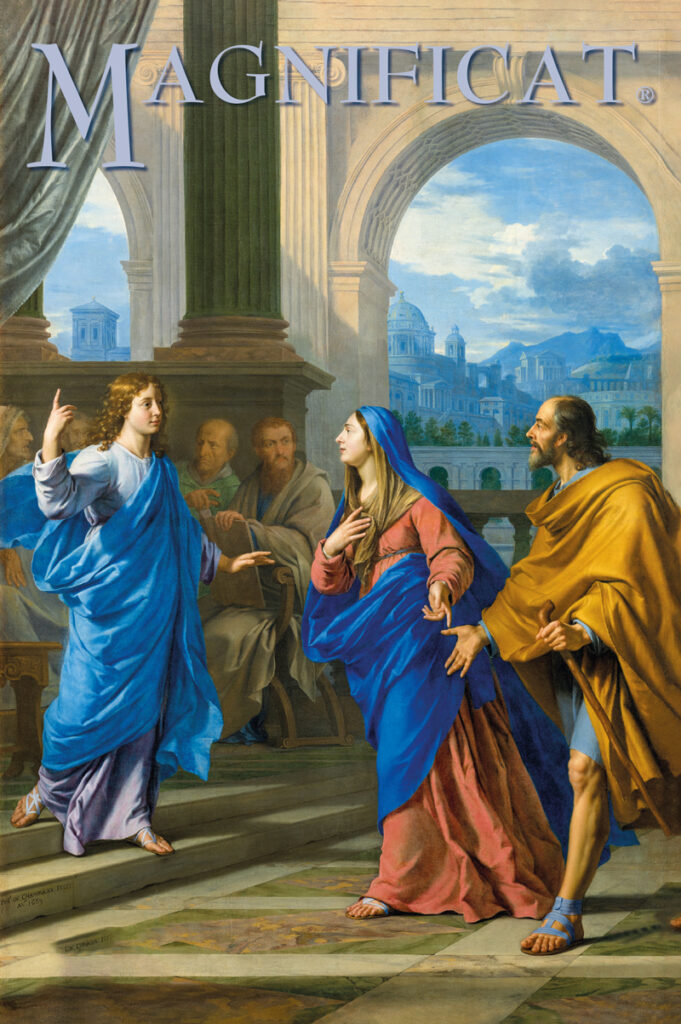
Philippe de Champaigne (1602–1674) was 61 years old when he painted this picture for the Carthusian church in Paris. It is a work of maturity, illuminated by the supernatural shades of blue that were his secret—here on Jesus’ toga, Mary’s palla (mantle), and the view of Jerusalem beyond the openwork arcades of the Temple. We find again here, to an excellent degree, the theological dimension that he usually gave to the shadows. At the time of the original tohu wa-bohu (formless void), there was nothing but confusion, and then through the play of shadows and light the Creator brought differentiation and diversity into the world. Similarly a painter must make use of shadow in order to give distinction and relief to his works. This principle proves accurate both in the details—the quality of the draperies—and in the groupings—only Jesus, Mary, and Joseph are in the light, thus distinguished from the subjects of the Mosaic Law who remain half in the shadows, since they were unable to recognize the light born from light.
Hands that speak
Jesus is 12 years old. After seeking him for three days, his parents find him again in the Temple. The artist presents to us the moment of their reunion. He composes his work on both sides of the line traced out by the play of the figures’ hands, a line that ends at Jesus’ index finger, pointing toward the highest heavens. And look: the interplay of these hands allows us to hear the dialogue of the episode (Luke 2:48): Mary’s right hand resting on her heart says: Son, why have you treated us so? while her left hand, pointing to Joseph, says: See, your father and I have been looking for you anxiously! Joseph’s right hand supports Mary’s words with all his paternal authority and joins in her questioning. Jesus’ left hand attempts to calm his parents and answers them: How is it that you sought Me?; finally, His right hand gives the full story of the episode: Did you not know that I owe myself to my Father’s work?
A moment of eternity
Did you not know that I owe myself to my Father’s work? Here we have the first words of Jesus recorded by the Gospel. And the reason is to reveal to us the mystery of the Incarnation. By its nature, painting, like photography, is a snapshot. The artist’s art is to cause this fixed moment to speak by making visible much more than its objectivity shows. Here, the Catholic painter Champaigne comes to grips with the calling to express in this moment nothing less than eternity: Isn’t eternity a moment without beginning or end, yet filled with both meaning and accomplishments? And so look at how Champaigne causes the grace of the Incarnation, contemplated from the perspective of eternity, to be fulfilled right before our eyes. Thus in this Gospel narrative, related in a painting, what is offered for our contemplation is ultimately the ontological state of the event, taken in its unchangeable essence. In this regard we can admire how the figure—so beautifully human!—of the young man Jesus manages to express the Divine Trinity at work in the kenosis (emptying-out) of the Son: his garments are blown up and stirred by the breath of the Holy Spirit,* and his whole being is expressed in his index finger that points to the Father who sent him.
*Indeed, see how, of all the figures and objects, the wind stirs only the garments of Jesus.

Movie fragments
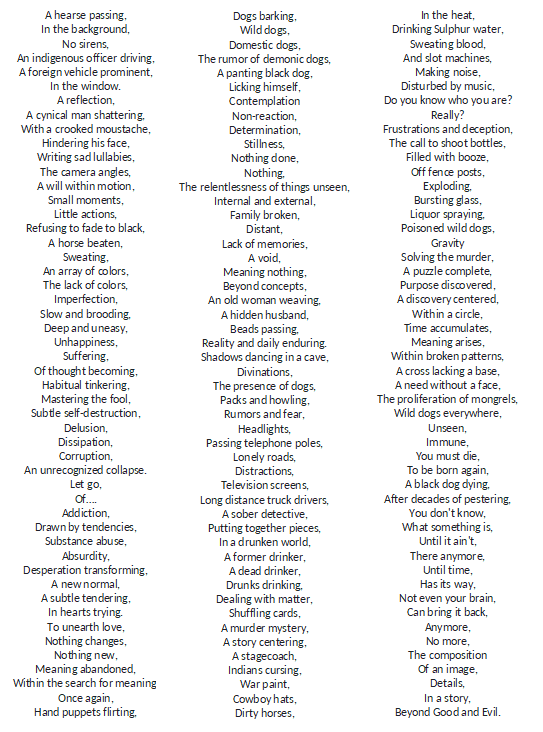


Recent Comments